The significant fall in unemployment between 2015 and 2022 in France did not withdraw poverty, says the National Council of Social Policy and Exclusion (CNLE) in a study published this week.
Although the unemployment rate fell from 10.3% to 7.3% during the period, the monetary poverty rate, defined as the proportion of people who earn less than 60% of the average income, increased by 14.2% to 14.4% very slightly, according to the data collected by the CNLE scientific committee.
The material and social deprivation rate increased from 12.1% to 13.1% of the population during the period. It measures the proportion of people who cannot cover at least five expenses of everyday life on a thirteen list, such as having a personal car, heating their accommodation, offering a holiday week or having a regular leisure activity.
The participation of people who were considered badly increased during the period, from 12.4% to 18.7%. The feeling of poverty has gained ground in 20% of the population at the most modest standard of living, but also in the second quintile, the study points out.
Three factors
“The reasons of the actors in the field converge in a diagnosis of the increase in tensions and aggressiveness of the social body in particular with the dematerialization of access to rights and insufficiency of the scales of help to needs, even for people in employment,” says the president of the Scientific Committee, Muriel Pucci.
The CNLE has identified three main reasons for the disconnection between the evolution of unemployment and poverty: some of the created works have not led to the exit of poverty, the degradation of the situation of the inactive withdrawal or invalid, and a more modern standard of living that has progressed less than the limit of monetary poverty.
The poverty rate of retirees has increased since 2017 and reached 10.8% in 2022, while contrary to what happened previously, the pension of new retirees has been slightly lower than that of all retirees, according to the study.
The CNLE is composed of the main institutional and associative actors involved in the fight against poverty and social exclusion. It is responsible for providing opinions to the government, guaranteeing a consultation between the various actors and establishing monitoring indicators.
Source: BFM TV


